Independent Bookstore Day!
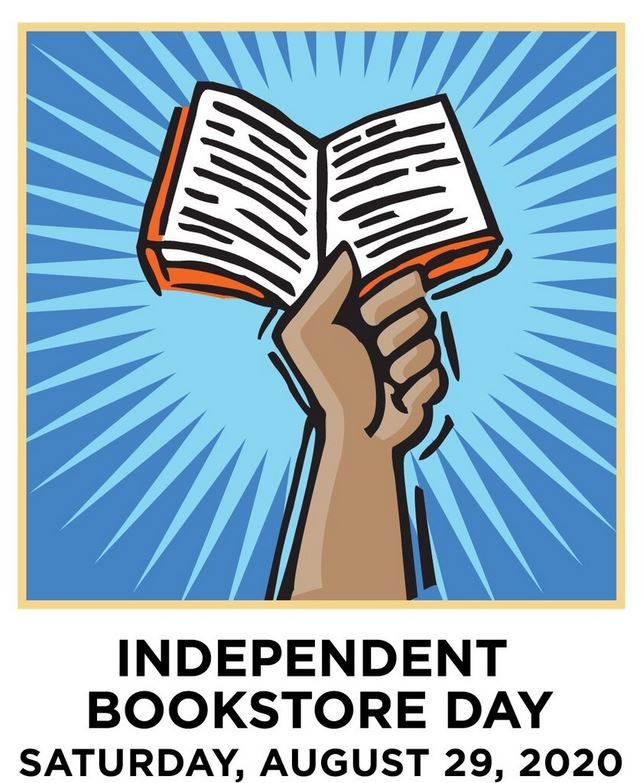

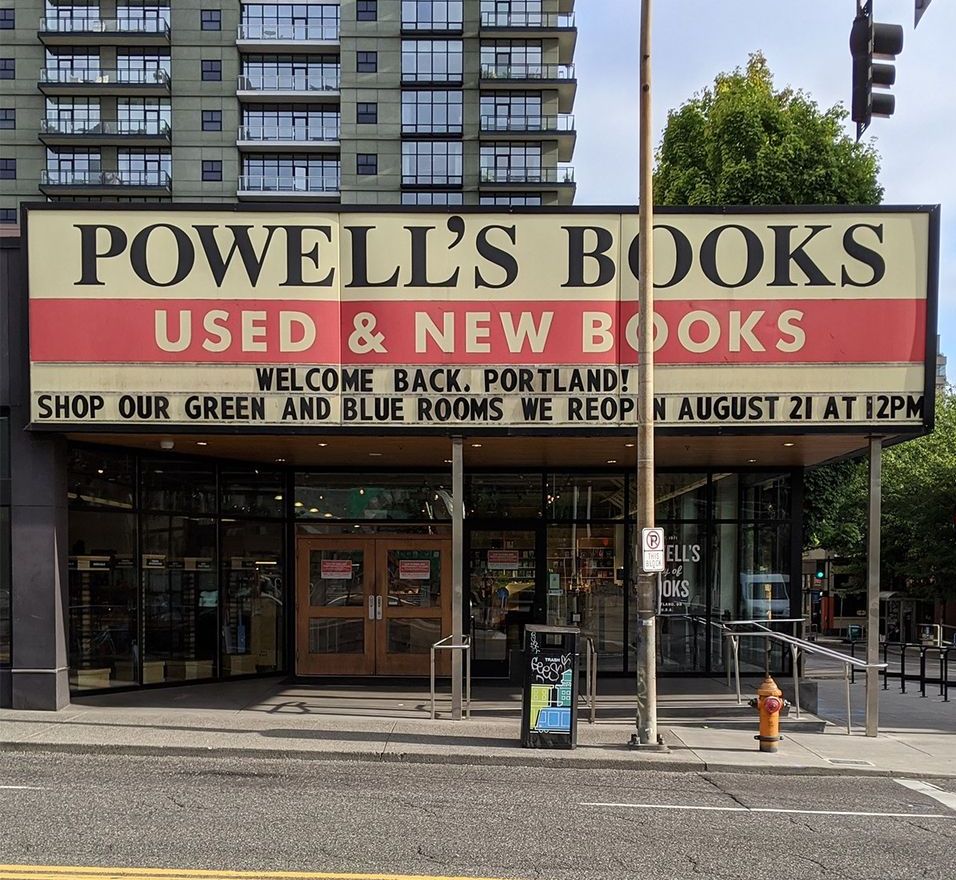 Powell's Books, Portland, Ore., is marking tomorrow's Independent Bookstore Day in an unusual way: to affirm its commitment to customers, the community and fellow bookstores, it is no longer going to sell through Amazon Marketplace, which for many rare, collectible and used booksellers is an important sales channel.
Powell's Books, Portland, Ore., is marking tomorrow's Independent Bookstore Day in an unusual way: to affirm its commitment to customers, the community and fellow bookstores, it is no longer going to sell through Amazon Marketplace, which for many rare, collectible and used booksellers is an important sales channel.
In an announcement to customers, Powell's Books CEO Emily Powell explained: "For too long, we have watched the detrimental impact of Amazon's business on our communities and the independent bookselling world. We understand that in many communities, Amazon--and big box retail chains--have become the only option. And yet when it comes to our local community and the community of independent bookstores around the U.S., we must take a stand. The vitality of our neighbors and neighborhoods depends on the ability of local businesses to thrive. We will not participate in undermining that vitality."
Powell observed that this was "not an easy decision to make. The Amazon third-party marketplace provides a critical source of revenue for many small and independent businesses, especially in economically difficult times. While it is challenging to step away at this time, Powell's is confident that this change is ultimately in the company's interest, and in the interest of the community of book lovers it serves."
After an employee tested positive 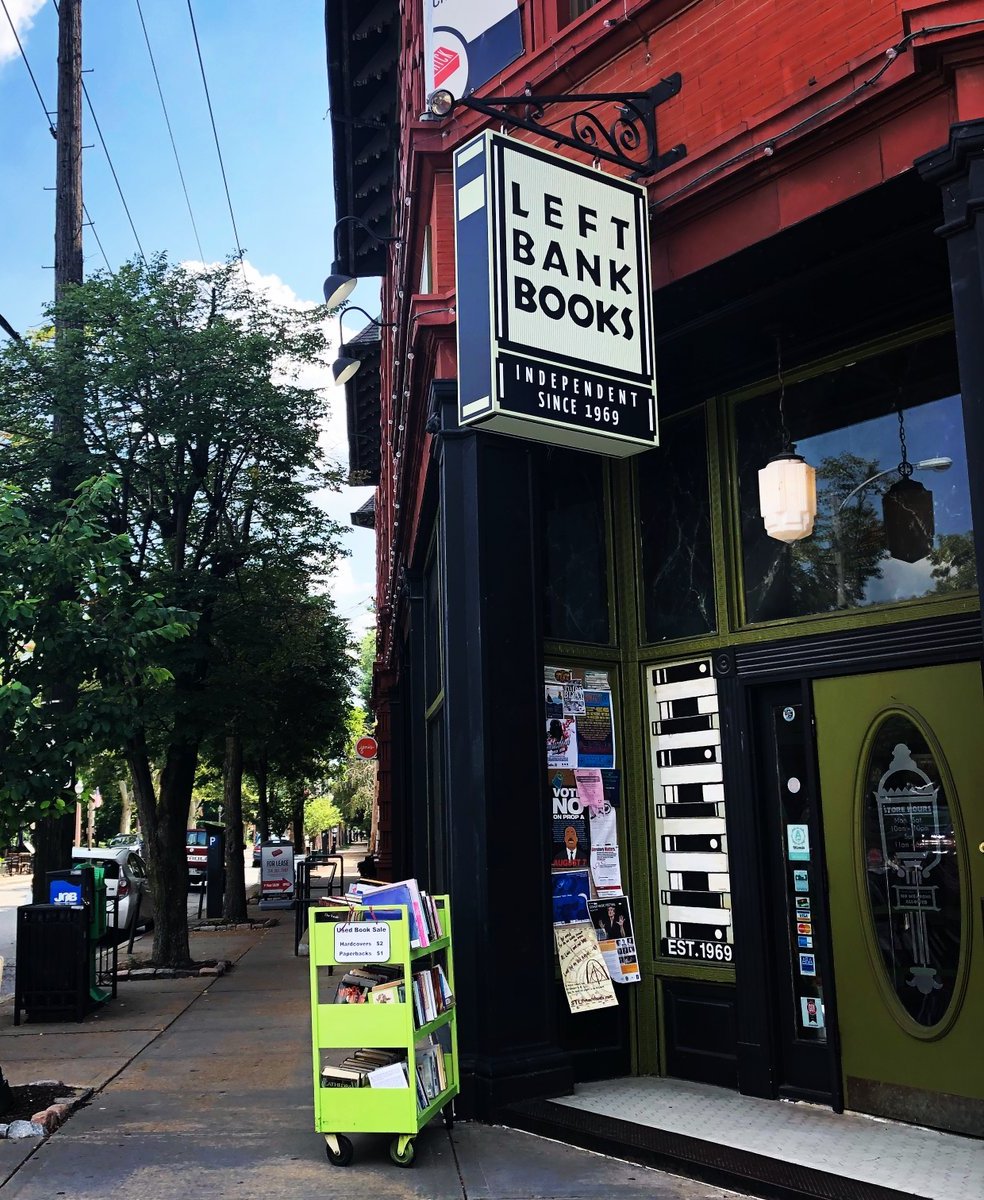 for Covid-19 on August 23, Left Bank Books in St. Louis, Mo., has suspended its curbside pick-up service until September 5. Co-owners Kris Kleindienst and Jarek Steele and their team are all working from home and are continuing to offer online shopping, phone shopping and contactless local delivery.
for Covid-19 on August 23, Left Bank Books in St. Louis, Mo., has suspended its curbside pick-up service until September 5. Co-owners Kris Kleindienst and Jarek Steele and their team are all working from home and are continuing to offer online shopping, phone shopping and contactless local delivery.
In the meantime, the store has been professionally cleaned and disinfected, and Kleindienst and Steele have required their entire staff to be tested. They've also pledged to cover any costs associated with those tests.
Prior to the bookseller testing positive, Left Bank Books was offering curbside pick-up but had not reopened for browsing. Staff members were wearing masks at all times while working in the store, workstations were spaced far enough apart to allow for social distancing and surfaces were routinely disinfected. These safety protocols will be continued when in-store operations resume in September.
Steele said the past few days have been "unlike any others that we've experienced," and noted that several changes the store made in the past have helped them handle this shift. Even though they no longer have two stores, Left Bank still has the phone system that allows staff to answer calls from their own cell phones. They installed GoToMyPC on the store's computers a few years ago because they're "workaholics," and the technology allowing them to dial in from home and look at their POS is invaluable now. They've been using Square for years, and at the start of the pandemic Steele and Kleindienst integrated their POS system with the store's website.
At the same time, Steele continued, they were not prepared for the "emotional toll this has taken on everyone who works at our store." In addition to missing the store and their tight-knit group of coworkers, "every person on staff without exception is afraid for their health and the health of their families," and that stress has been "exhausting."
Since they made the announcement earlier this week, the store's customers have been fantastic, they said. Customers have been extremely supportive throughout the whole pandemic, Steele added, and he thinks they "feel safer and understand that we are making decisions based on the ongoing relationship we want to have with them rather than the $12.50 we can make from them today." The response this week has been "overwhelmingly great" and the store has received a host of encouraging, supportive and understanding comments from customers.
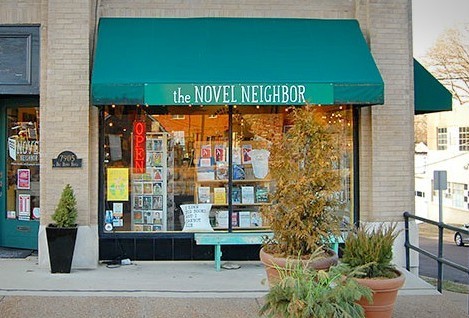 Left Bank has also received an outpouring of support from other independent bookstores, including The Novel Neighbor. Located in Webster Grove, Mo., Novel Neighbor is just a seven-mile drive from Left Bank Books and is one of the store's competitors. Nevertheless, owner Holland Saltsman reached out immediately to help.
Left Bank has also received an outpouring of support from other independent bookstores, including The Novel Neighbor. Located in Webster Grove, Mo., Novel Neighbor is just a seven-mile drive from Left Bank Books and is one of the store's competitors. Nevertheless, owner Holland Saltsman reached out immediately to help.
She offered to sell Left Bank's Independent Bookstore Day merchandise this Saturday and give Kleindienst and Steele not only the proceeds from that merchandise but also from Novel Neighbor's own IBD merchandise. They declined Saltsman's offer, thanking her profusely and saying she should "reap the benefits of her own significant labor."
Steele wrote: "This moment in time for all of us is revealing who we are and what we're made of, and what she's revealed here is extraordinary."
While the eight regional booksellers associations are all hosting virtual fall shows that will mostly run separately, they are working together to present online opening and closing keynote events. The opening keynote will feature the Rev. Al Sharpton and take place on Tuesday, September 15, 4:30-5:30 p.m. Eastern.
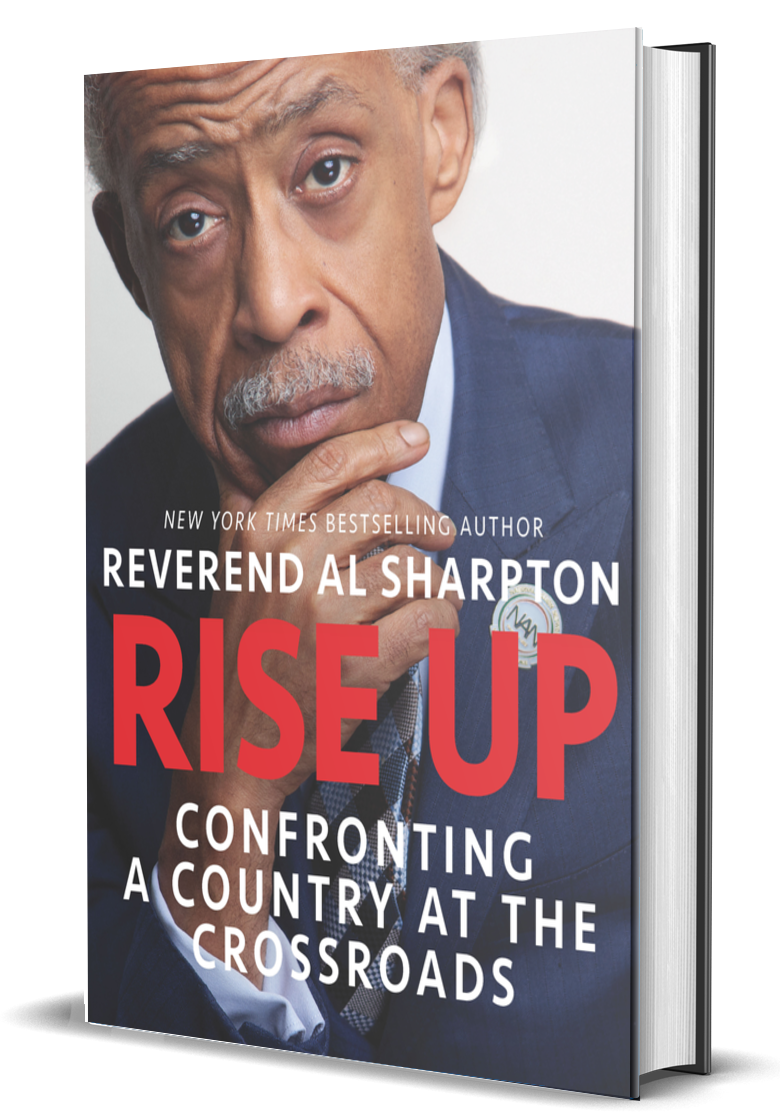 Sharpton will be in conversation with Ramunda Lark Young, co-owner of MahoganyBooks, Washington, D.C., and will take questions from attendees. The event will be held via Zoom, and access will be limited to association member booksellers. Booksellers may register for free here. Approved attendees will receive the Zoom link prior to the event.
Sharpton will be in conversation with Ramunda Lark Young, co-owner of MahoganyBooks, Washington, D.C., and will take questions from attendees. The event will be held via Zoom, and access will be limited to association member booksellers. Booksellers may register for free here. Approved attendees will receive the Zoom link prior to the event.
Sharpton is the host of MSNBC's PoliticsNation, host of the radio show Keepin' It Real, founder and president of the National Action Network and a longtime civil rights leader.
Sharpton's new book, Rise Up: Confronting a Country at the Crossroads, to be published by Hanover Square Press on September 29, focuses on the highlights of the Obama administration, the 2016 election, President Trump's hold on the GOP and his interactions and relationships with other key players in politics and activism. He also amplifies the new voices and movements that have emerged in response to the Trump presidency.
 |
|
| Svetlana Alexievich | |
The International Publishers Association and the Federation of European Publishers have called on Belarus President Alexander Lukashenko to cease his campaign of violence and intimidation against peaceful protests, and upon the international publishers of Nobel Literature Prize laureate Svetlana Alexievich to demonstrate their support for the author as she faces interrogation by the Lukashenko regime.
"We stand in solidarity with all those in Belarus who are using their freedom of expression to achieve change through peaceful, constructive dialogue. The repression we are seeing in Belarus is despicable and must stop," said IPA president Hugo Setzer.
FEP president Rudy Vanschoonbeek commented: "We call on all the international publishers of Svetlana Alexievich's books to make their voices heard. We need you to raise international awareness of the horrific situation in Belarus and help bring about a diplomatic, peaceful end to this crisis."
Belarus authorities have accused Alexievich of being part of an "illegal power grab" and threatened her with prosecution and jail. The IPA and FEP called on the government to drop all such charges immediately as a first step in paving the way for free, democratic processes to unfold. The organizations stand behind the statement issued August 25 by the European Writers' Council.
---
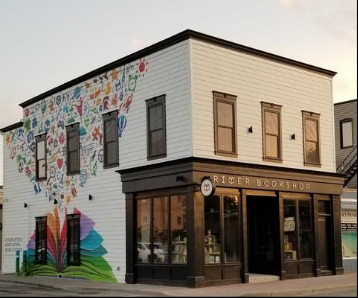 "I don't know that it's even believable that you would try and do this but life goes on," Canadian bookseller Lori Wightman told CBC News regarding the recent opening of River Bookshop in Amherstburg, Ont., in the midst of the Covid-19 pandemic. "We just kind of took the leap and... it's been really good.... People have been very receptive.... They love the outside, they love the inside."
"I don't know that it's even believable that you would try and do this but life goes on," Canadian bookseller Lori Wightman told CBC News regarding the recent opening of River Bookshop in Amherstburg, Ont., in the midst of the Covid-19 pandemic. "We just kind of took the leap and... it's been really good.... People have been very receptive.... They love the outside, they love the inside."
She added that planning was the most important ingredient in opening the bookshop during a pandemic: "Any business, if you can adapt and kind of pivot, depending on what you're doing, depending on the circumstances, I don't think there is any reason why you couldn't ride out this,.... We're prepared if it should go either way, we'll just make the necessary changes so we can keep doing what we're doing."
---
The mysterious case of the "shuttered" Japanese bookshop: Sangatsu Shobo, a much-beloved bookshop in Kyoto's Nakagyo Ward, recently closed after 70 years in business, but "is still springing surprises on passers-by," the Asahi Shimbun reported, noting that the building "now bears a meticulous spray painting on the shutter based on a photo of the store front as it was, giving the impression it is still open."
After posting a sign in June saying "closed seven days a week, closed all year round," owner Tatsuo Shishido felt that leaving the shutter down would not help the neighborhood's ambience, so he arranged to have it painted. "I hope people will be fooled into thinking that a store they thought had closed was still actually open," he said. "Some people may say I am not going away gracefully by doing this." --Robert Gray
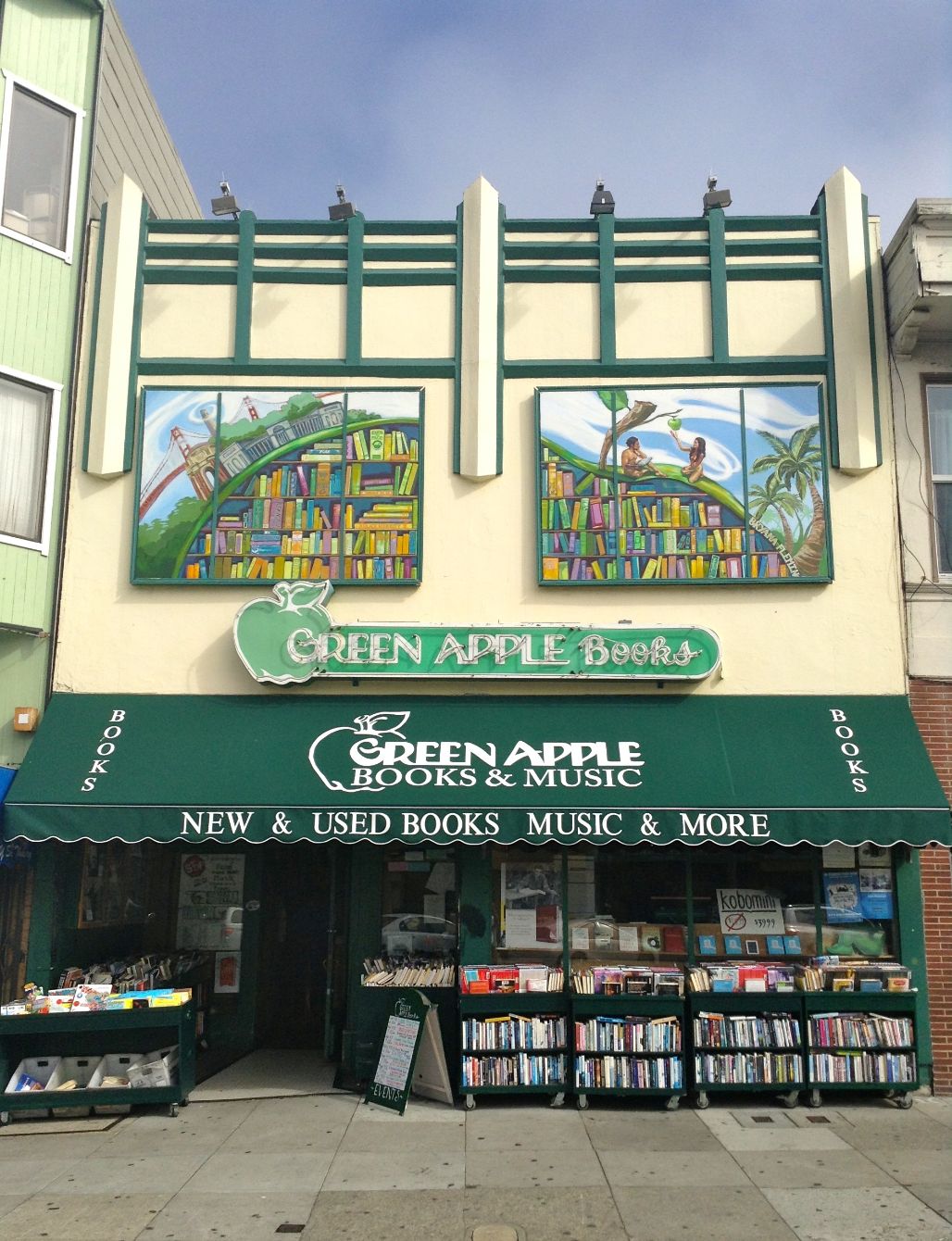 In San Francisco, Calif., all three Green Apple Books locations are open at limited capacity and with slightly reduced hours, reported co-owner Pete Mulvihill. He and the team have taken a variety of safety precautions, including having all staff and customers wear masks and use hand sanitizer or wear gloves. Workstations been moved further apart; there are daily symptom checks for staff; and anyone with any possible Covid symptoms is instructed to stay home. All told, they are "following SF DPH guidelines to the letter and exceeding them where we can."
In San Francisco, Calif., all three Green Apple Books locations are open at limited capacity and with slightly reduced hours, reported co-owner Pete Mulvihill. He and the team have taken a variety of safety precautions, including having all staff and customers wear masks and use hand sanitizer or wear gloves. Workstations been moved further apart; there are daily symptom checks for staff; and anyone with any possible Covid symptoms is instructed to stay home. All told, they are "following SF DPH guidelines to the letter and exceeding them where we can."
While the stores have not been directly affected by the recent blackouts or wildfires in California, Mulvihill continued, many staff members have families living near or in evacuation areas. Just this week, he added, he helped a former colleague move into a temporary space after evacuating their home. The smoky air in San Francisco is definitely a concern, but given what so many people are experiencing because of the wildfires, Mulvihill and the team are "counting our proverbial blessings."
On the subject of his staff, Mulvihill noted that roles have changed drastically over the past several months. There are so many more web orders, and there is much less buying of remainders, magazines, cards and nonbook gifts as the store tries to preserve cash. The occasional customer who resists using hand sanitizer or has difficulty keeping their mask on correctly also does not help with the larger climate of "fear, worry, stress and uncertainty" that currently prevails. Despite all of the difficulties, everyone is pitching in as best as they can, and Mulvihill said they were grateful for the staff's "work, reliability, adaptability and customer service."
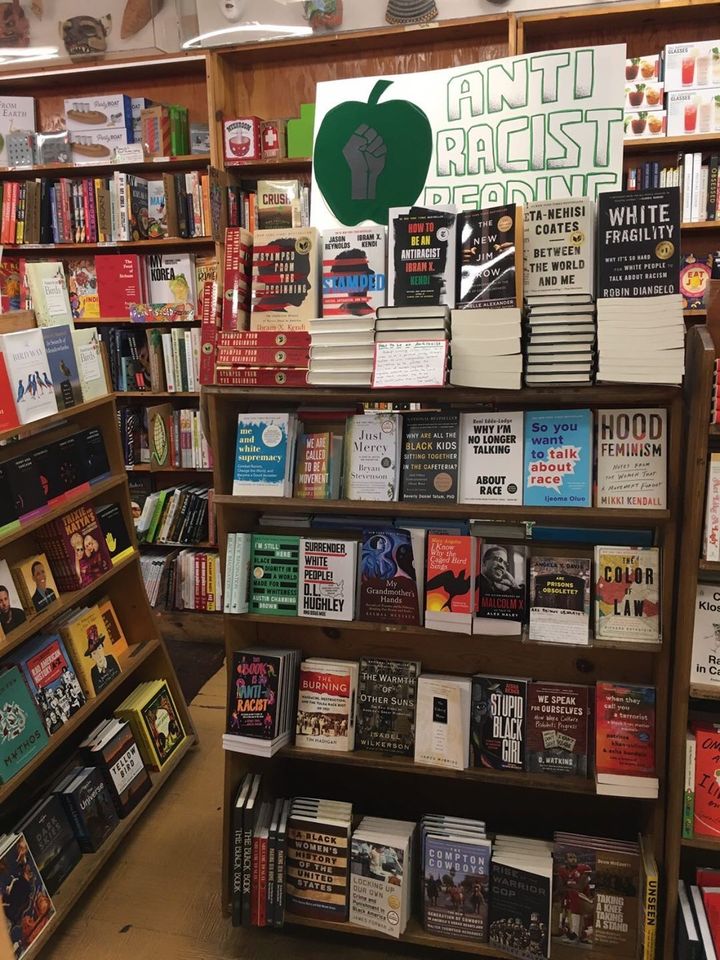 With the surge in web sales, Green Apple is selling a broader-than-usual range of titles online. At the same time, in-store discovery is not happening the way it used to, and the breadth of titles carried at the stores is less than usual. To guard against supply chain "hiccups," Green Apple is ordering more copies of the books the team thinks will be big, while ordering fewer copies of midlist books and taking fewer chances with titles deeper in the lists. The stores are also selling down overstock of items like remainders, gifts, cards and LP records.
With the surge in web sales, Green Apple is selling a broader-than-usual range of titles online. At the same time, in-store discovery is not happening the way it used to, and the breadth of titles carried at the stores is less than usual. To guard against supply chain "hiccups," Green Apple is ordering more copies of the books the team thinks will be big, while ordering fewer copies of midlist books and taking fewer chances with titles deeper in the lists. The stores are also selling down overstock of items like remainders, gifts, cards and LP records.
Throughout the pandemic, the Green Apple team has been "incredibly moved" by the support the store has received from community members, including unsolicited donations as well as several local high schools ordering class sets from Green Apple for the first time. Local authors and artists also helped get the word out, and assistance and support from organizations like the ABA, Libro.fm and Bookshop.org has been extremely important.
"We're not out of the woods yet," Mulvihill said, "but I feel more confident that our stores will weather all this than I did in, say, late March."
---
 Becky Dalton, owner of The Vermont Book Shop in Middlebury, Vt., said her store has experienced a "one-two punch" of the coronavirus pandemic coinciding with a major infrastructure project taking place right outside her door.
Becky Dalton, owner of The Vermont Book Shop in Middlebury, Vt., said her store has experienced a "one-two punch" of the coronavirus pandemic coinciding with a major infrastructure project taking place right outside her door.
For the latter disturbance at least, Dalton noted, she and her team had years of warning, so they had already established a remote pick-up location for orders and a pop-up shop at a public market outside the construction zone. The store has not yet reopened for browsing at the main location, due in roughly equal parts to access and parking issues from the construction project and health and safety concerns because of the pandemic.
Dalton reported that her booksellers have been "remarkably resilient throughout," and have all remained healthy. Everyone is committed to maintaining a safe work space by wearing masks, working from home when possible and social distancing while inside the store. Only one staff member remains laid off; Dalton hopes to bring her back soon.
While there have been no issues with mask compliance because the store isn't open for browsing, Dalton and her staff have had some negative customer interactions stemming from delays and confusion about the store's current operating procedures. She and her booksellers try to be as clear and as accommodating as possible, but people's patience can be thin these days. That said, she added, most of the store's customers have been "amazingly supportive and encouraging."
The pandemic and the construction project have had a major impact on Dalton's buying. For the past several months the majority of the store's receipts have been for special orders, and Dalton is only now "picking up the crumbs of my fall frontlist orders." With so much going on, it's been impossible to review catalogs, take rep meetings or read trade publications as she normally would. She noted that while she doesn't expect her orders to return to pre-covid levels anytime soon, she does hope to resume a more normal buying routine for the winter/spring catalogs.
After the murder of George Floyd in May and the subsequent nationwide protests, Vermont Book Shop saw a spike in orders of titles about social justice and race relations. The store struggled to get enough inventory and had to work overtime to process orders, but they made it through the surge. The shooting of Jacob Blake earlier this week, Dalton continued, is a "stark reminder that the nation has an awfully long way to go." --Alex Mutter
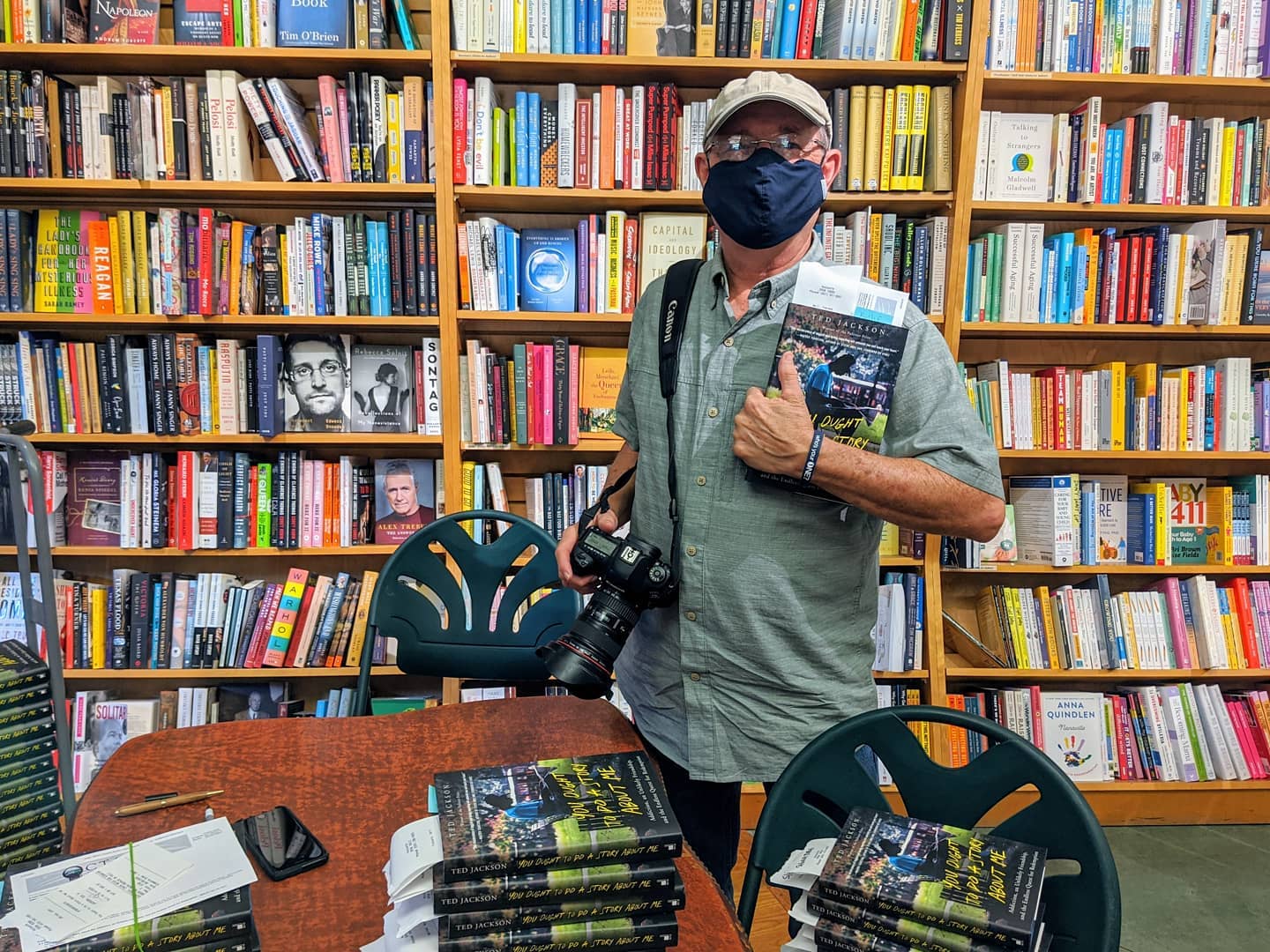 Photojournalist Ted Jackson signed copies of You Ought to Do a Story About Me (Dey Street) at Octavia Books in New Orleans, La., yesterday, ahead of his virtual launch event, a conversation with author Jonathan Eig.
Photojournalist Ted Jackson signed copies of You Ought to Do a Story About Me (Dey Street) at Octavia Books in New Orleans, La., yesterday, ahead of his virtual launch event, a conversation with author Jonathan Eig.
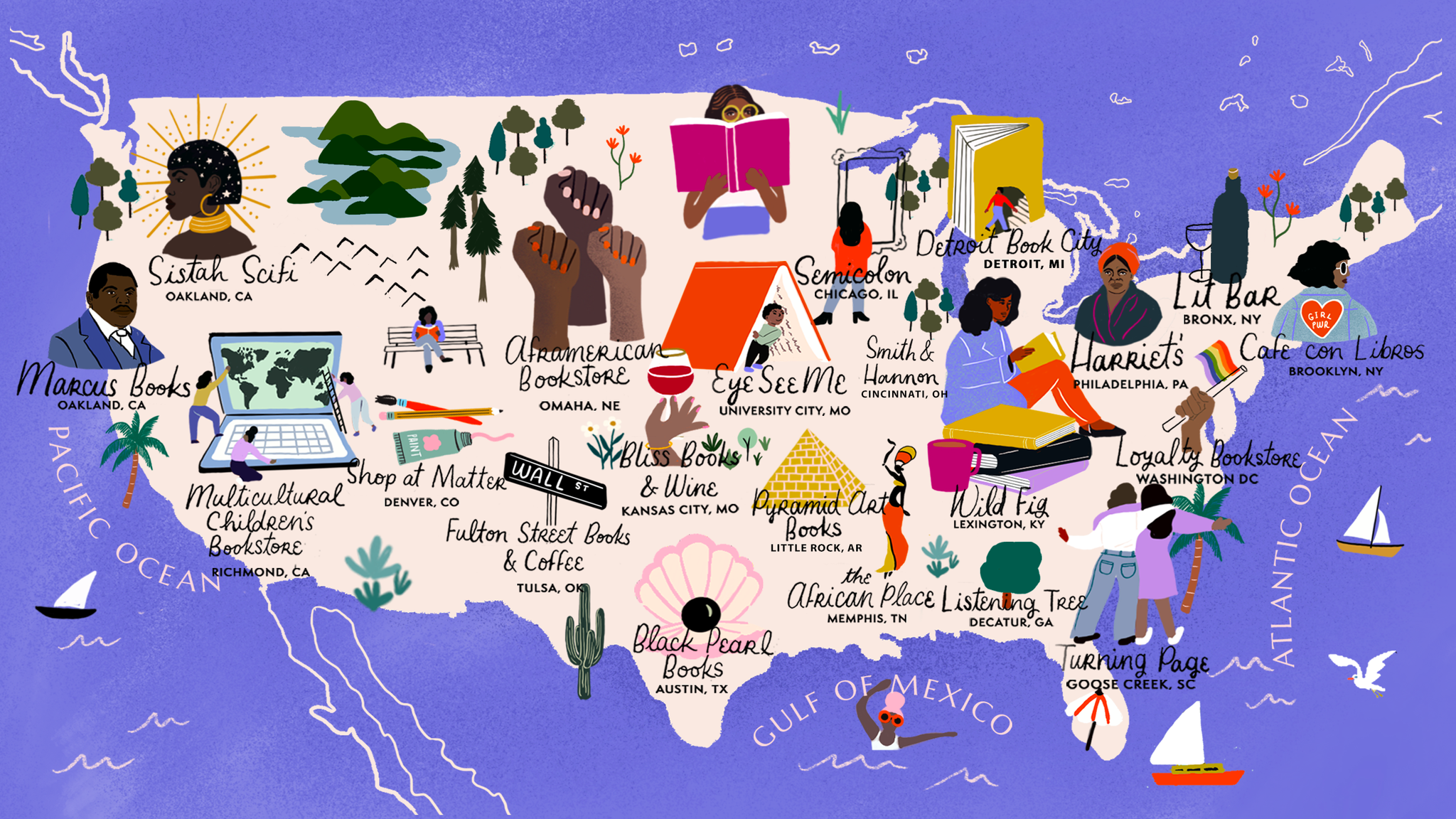 O, the Oprah Magazine featured "120 Black-owned bookstores in America that amplify the best in literature," as well as the favorite bookshops of renowned authors like Tayari Jones, Deshawn Winslow, Jacqueline Woodson, Nicole Dennis-Benn and Kiley Reid.
O, the Oprah Magazine featured "120 Black-owned bookstores in America that amplify the best in literature," as well as the favorite bookshops of renowned authors like Tayari Jones, Deshawn Winslow, Jacqueline Woodson, Nicole Dennis-Benn and Kiley Reid.
"While institutionalized racism and police brutality have long been a part of America's history, millions across the country are now reconciling with and addressing generations of racial inequality," McKenzie Jean-Philippe wrote. "For some, that means taking to the streets in protest. For others, it's uplifting the cause by supporting Black owned businesses, or seeking education through anti-racist literature. Because of the latter, one industry that's seen an influx in support and attention are Black-owned bookstores. Many shops across the country are overwhelmed with customers due to the collective push to both 'buy Black' and read books written by Black authors."
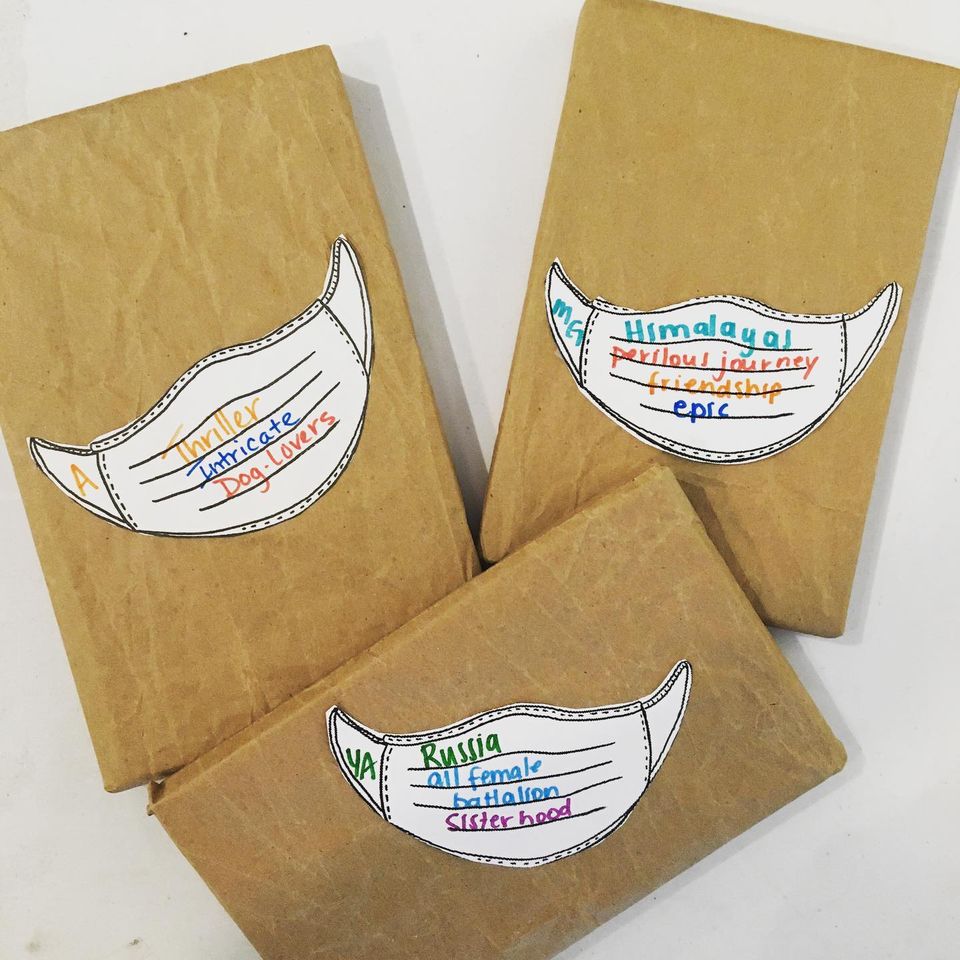 Posted on Facebook by the Novel Neighbor, Webster Groves, Mo.: "Even our (free with purchase*) books are in masks for #bookstoreday this Saturday 8/29, 10-5. Please check out link in profile for all the details. #morethanabookstore #IBD2020 #shoplocal *whilesupplieslast."
Posted on Facebook by the Novel Neighbor, Webster Groves, Mo.: "Even our (free with purchase*) books are in masks for #bookstoreday this Saturday 8/29, 10-5. Please check out link in profile for all the details. #morethanabookstore #IBD2020 #shoplocal *whilesupplieslast."
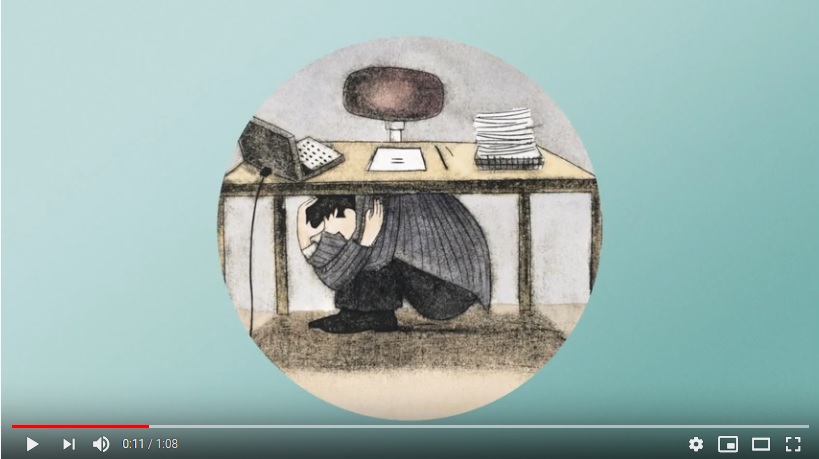 The Anxiety First Aid Kit: Quick Tools for Extreme, Uncertain Times (New Harbinger Publications).
The Anxiety First Aid Kit: Quick Tools for Extreme, Uncertain Times (New Harbinger Publications).
Tomorrow:
CBS This Morning: Sarah Frey, author of The Growing Season: How I Built a New Life--and Saved an American Farm (Ballantine, $27, 9780593129395).
Bullseye with Jesse Thorn: Marilyn Chase, author of Everything She Touched: The Life of Ruth Asawa (Chronicle Books, $29.95, 9781452174402).
HBO is developing a series based on Michael Crichton's novel Sphere, Deadline reported. The project is from executive producer/writer Denise Thé (Westworld); Lisa Joy and Jonathan Nolan's Kilter Films; Robert Downey Jr. and Susan Downey's Team Downey and Warner Bros. Television.
The series will be written by Thé, who also serves as showrunner and executive producer. Most recently exec producer and writer on Season 3 of Westworld, she also wrote and produced Person of Interest, on which she first worked with Westworld co-creator Jonathan Nolan, and was writer and consulting producer on Gotham. Thé's writing credits also include Medium, Cold Case and Terminator: The Sarah Connor Chronicles.
The Writers' Trust of Canada has announced finalists for the C$10,000 (about US$7,585) RBC Bronwen Wallace Award for Emerging Writers, honoring writers of poetry and short fiction under the age of 35 who have published poetry or prose in a literary magazine or anthology, but not yet been published in book form and are without a book contract; the C$10,000 Dayne Ogilvie Prize for LGBTQ Emerging Writers, given to an emerging writer who is from the lesbian, gay, bisexual, transgender or queer community and demonstrates great promise through a body of work of exceptional quality; and the C$10,000 Writers' Trust McClelland & Stewart Journey Prize, recognizing the year's best short story by an emerging writer first published in a Canadian literary journal or anthology. Winners will be announced October 21 as part of the Digital Writers' Trust Awards virtual event.
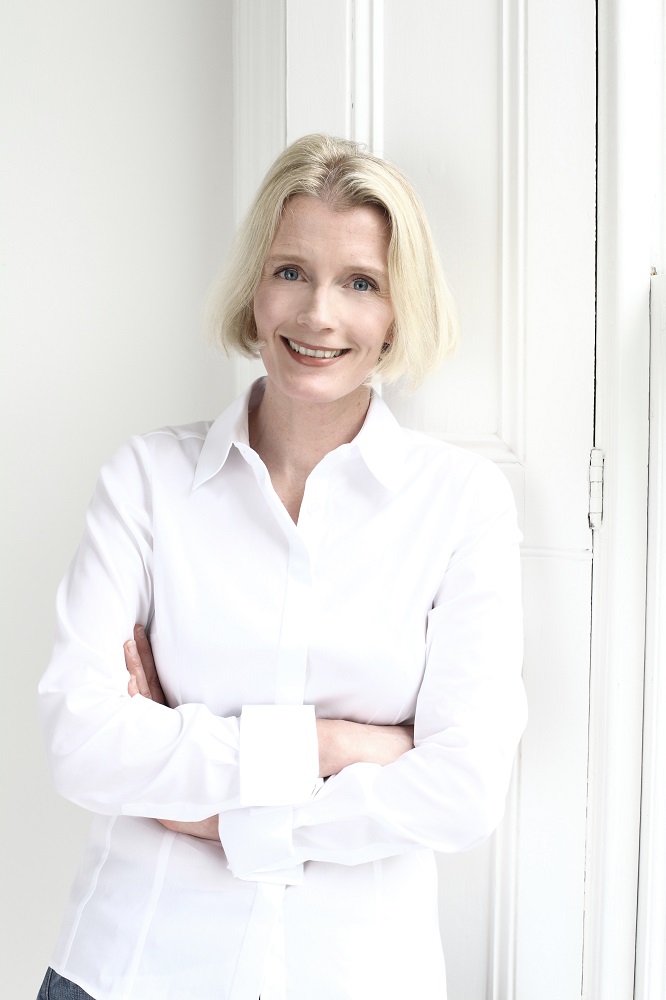 |
|
| photo: Laurie Fletcher | |
British writer Wendy Holden was a national newspaper and magazine journalist before becoming a full-time author. She wrote 10 comic novels, selling more than 3 million copies, before turning to historical fiction. The Royal Governess (Berkley, August 28, 2020) is a novel about the little-known childhood of Queen Elizabeth II and the lively young teacher who made her the monarch she is today.
On your nightstand now:
I'm researching my new novel on Wallis Simpson and so am back in the 1930s, also the setting for The Governess. I'm reading Cecil Beaton's Bright Young Things by Robin Muir. It is slightly too big for the nightstand and therefore lying on the floor next to the bed. But it's a completely fascinating portrait of an era of excess. The glamorous, eccentric people Beaton photographed are walking straight into my story!
Favorite book when you were a child:
My grandmother had a souvenir book of the 1937 coronation. It was huge and had gold cloth covers; I thought it was the most glamorous thing ever. Inside were lots of pictures of the royal family, mostly sepia, but also some beautiful full-page early colour photographs. But beyond the glamour and glitter I could see, even as a child, that the Windsors were all completely distinct characters: grumpy George V, thunderous-looking Queen Mary, sphinx-like Mrs. Simpson and the beautiful, bored Prince of Wales. I knew even then I'd put them all in a novel one day.
Your top five authors:
They're all comic writers because we desperately need to be cheered up at the moment. Flying the flag for the Brits here, but Cold Comfort Farm by Stella Gibbons is a side-splitting satire about country life. Sensible Flora, down on her luck, must leave London to live with her rustic cousins in the village of Howling.
I also love the Adrian Mole books by Sue Townsend, and the fantastic graphic novels of Posy Simmonds, especially Tamara Drewe--a reworking of Far from the Madding Crowd--and Gemma Bovery, a reworking of--well, you can guess!
And no list of funny English lady writers can leave out Nancy Mitford, whose Love in a Cold Climate, about the crazy posh Radlett family, is perfection. Finally, a shout-out for a great American comic novel The Serial by Cyra McFadden. It's about a hipster couple in 1970s California and so funny you can't read it in public.
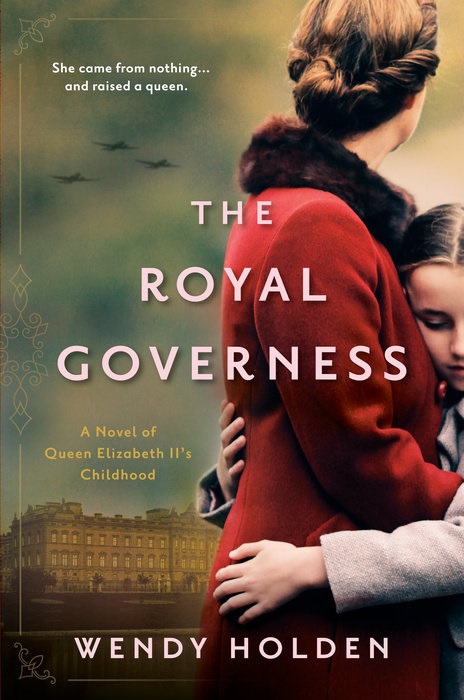 Book you're an evangelist for:
Book you're an evangelist for:
I try to convince people that War and Peace is a fun read, but no-one ever believes me. I love it, though. Prince Andrey Bolkonsky is one of my favourite literary heroes, knocking Mr. Darcy into a cocked hat.
Book you've bought for the cover:
When I was researching The Governess, a good source of material was a stall in the market in the nearby town. It sold secondhand books, mostly from house clearances. The local area clearly had a lot of royal fans because there were avalanches of books about the Windsors, mostly hagiographies from the 1950s and '60s with stirring titles like Our Noble Young Queen. While usually syrupy in the extreme, these almost always contained some fascinating nugget I had not read before. I always bought them for the covers; they were all I had to go on, always featuring royalty, often surrounded by beautiful heraldry. I snapped them up by the dozen!
Book you hid from your parents:
Like most '70s parents, mine weren't all that interested in what I was doing. It would never have occurred to them to police my reading. But I was a very pretentious, aspirational child and my working-class family used to laugh at me for that. I probably hid the "improving" books I got out of the library--volumes about elocution, the British peerage and so on.
Book that changed your life:
Testament of Youth by Vera Brittain. This account of a young girl's life derailed by the First World War is famously a feministic classic and a passionate argument for pacifism. But what really spoke to me was the plight of the teenage Vera, stuck in the Edwardian north of England and desperate to go to Oxford. Stuck in the north of England some 70 years later and desperate to go to Cambridge, I took both comfort and courage from Vera's iron determination in preparing for the entrance exams. If she could teach herself Greek Responsions (whatever they were), I figured that I could struggle through Beowulf.
Favorite line from a book:
"And his answer trickled through my head like water through a sieve." This is from "The White Knight's Song," a poem in Alice Through the Looking Glass by Lewis Carroll. It's not just that the poem makes me laugh, the line completely captures that inability to remember what someone has said, even while they are saying it.
Book you most want to read again for the first time:
None, because if I like them, I enjoy them even more when I read them again.
Five books you'll never part with:
Two exercise-book diaries made by my children, when small, about a family holiday in Rome. They're battered, stained and curling at the edges but entirely beloved. The other three would have to be selected from my vast collection of photo albums and scrapbooks, all of which provide surprising surges of memory when opened. My husband says they'll help prevent Alzheimer's.
The best book you've read this past year:
I really enjoyed The Book of Longings by Sue Monk Kidd. It imagines that Jesus had a wife: clever, rebellious Ana. All the familiar characters are imagined as real people. Herod is fantastically evil, and Jesus sexy and charismatic. I love fictionalisations; it's what I do myself.
Igifu by Scholastique Mukasonga, trans. by Jordan Stump (Archipelago, $18 paperback, 160p., 9781939810786, September 15, 2020)
 A Rwandan exile living in France, Scholastique Mukasonga pulled from her extraordinary life to write two notable memoirs, Cockroaches and The Barefoot Woman (a 2019 National Book Award Translated Literature finalist). Autobiographical elements continue to haunt her exquisite collection, Igifu, through five wrenching stories. Born in 1956, Mukasonga had a tumultuous childhood marked by horrific anti-Tutsi violence that forced her family from their home village. The ongoing expulsions and persecutions culminated for Mukasonga during the 1994 genocide with the massacre of 27 family members. Two years earlier, Mukasonga had settled in France.
A Rwandan exile living in France, Scholastique Mukasonga pulled from her extraordinary life to write two notable memoirs, Cockroaches and The Barefoot Woman (a 2019 National Book Award Translated Literature finalist). Autobiographical elements continue to haunt her exquisite collection, Igifu, through five wrenching stories. Born in 1956, Mukasonga had a tumultuous childhood marked by horrific anti-Tutsi violence that forced her family from their home village. The ongoing expulsions and persecutions culminated for Mukasonga during the 1994 genocide with the massacre of 27 family members. Two years earlier, Mukasonga had settled in France.
Her horrifying loss sparks the collection's final--and most indelible--story, simply titled "Grief," in which a Tutsi woman living in France learns of the personal implications of the Rwandan genocide. The piece presents an unnamed protagonist--because she could represent any survivor--who, unable to mourn the tragic magnitude from afar, travels to her home village, where she meets "the guardian of the dead" who reveals her family's gruesome fate, yet somehow offers seeming comfort: "don't let anyone try to tell you to get over your loss, not if that means saying goodbye to your dead. You can't: they'll never leave you, they stay by your side to give you the courage to live."
Each of Mukasonga's other stories expose raw moments of excruciating challenge. "Igifu" means "hunger," a constant state of being for a girl and her family. Starvation nearly kills her, but she's revived by middle-of-the-night kindness that comes almost too late. In "The Glorious Cow," previously published as "Cattle Praise Song," a young man recalls his pastoral childhood among a family of devoted caretakers to beloved cows, and their destruction when genocide sweeps through his homeland. That perpetual anticipation of slaughter drives "Fear," a relentless reality that merely changes in degrees from "everyday" to "great fear." In "The Curse of Beauty," a Tutsi woman is punished her entire (short) life for being beautiful, by men who threaten, buy, abuse, discard and eventually murder her.
Providing welcome continuity, French professor Jordan Stump translates the book, making Igifu the third of Mukasonga's four English-language titles Stump has translated with graceful agility. Originally published in France in 2010, Igifu seems to serve as a bridge among Mukasonga's oeuvre, moving from memoirs (debuting in 2006 and 2008 in France) to this short fiction, to her first novel, Our Lady of the Nile, initially published in 2012, in the U.S. in 2014. Despite the undeniable terror, Mukasonga's storytelling proves illuminating and resilient. --Terry Hong, Smithsonian BookDragon
Shelf Talker: National Book Award finalist Scholastique Mukasonga continues to plumb autobiographical elements from her extraordinary personal history in her haunting five-story collection.
We are, as a consequence of this pandemic, bodily cut off from one another. Disconnected. Isolated. But perhaps this sense of our separation one from another, is simply a heightening of what we felt before this all began. We are thinking now, not only about how long this will last, but also what happens on the other side. To reconnect we need, perhaps, to learn to listen more closely. To each other. To our communities. To other cultures. To nature itself.
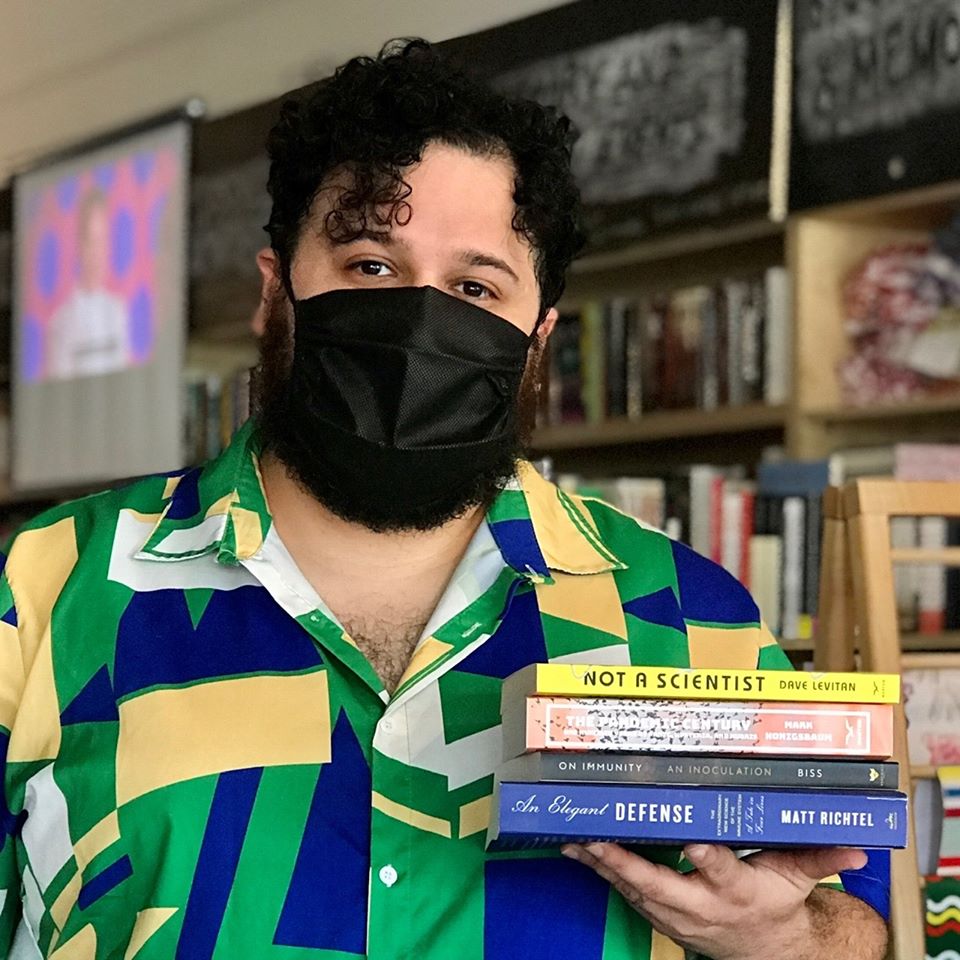 |
|
| Handselling in the age of coronavirus, at Avid Bookshop, Athens, Ga. | |
I always understood that handselling was a performance--sometimes subtle, sometimes overt, always passionate--and that the bookstore sales floor was a stage set. I didn't think I was cut out for the role at first and then gradually, surprisingly, found that I was. Would it be different now, I wonder, to be part of reinventing the art of handselling for the pandemic-driven age of Zoom, Facebook and YouTube videos--from stage to screen?
Where do we go from here?

The audio dramas that comprise Metamorphosis: A Viral Trilogy by André Alexis are currently premiering over a three-week period on the websites of theatrical partners TOlive.com, SummerWorks.ca and CanadianStage.com. The trilogy will be added to podcast apps September 7. For this project, Alexis teamed up with Ross Manson, founding artistic director of Toronto's Volcano Theatre Company, and sound designer Debashis Sinha.
Citing a study by arts market research groups La Placa Cohen and Slover Linett that found digital arts performances have attracted a more democratic audience than live performances, Manson told Quill & Quire: "A lot of people who do not feel invited to our fancy downtown venues are actually really interested. This is all bundled up in class, race and geography. I am really interested in who this work can include."
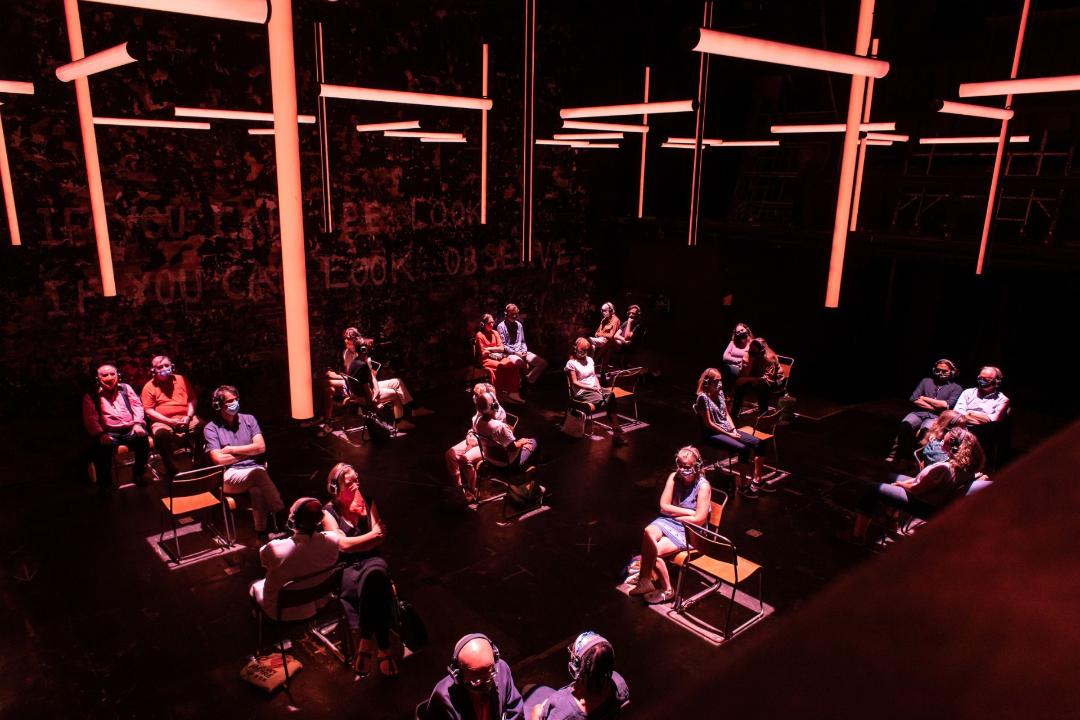 Like bookstores, some theaters are finding ways to gradually reopen their spaces in a limited capacity. London's Donmar Warehouse is staging a physically distanced adaptation of José Saramago's pandemic novel Blindness. Calling the production "a deliciously unnerving experience," the Guardian's reviewer noted that regular seating had been replaced "with wooden chairs scattered about in suitably distanced pairs. The audience, wearing face masks, sit under glowing bars of criss-crossing, color-changing light... that illustrate the story powerfully.... The rumbling sound design... creates a constant, aching tension."
Like bookstores, some theaters are finding ways to gradually reopen their spaces in a limited capacity. London's Donmar Warehouse is staging a physically distanced adaptation of José Saramago's pandemic novel Blindness. Calling the production "a deliciously unnerving experience," the Guardian's reviewer noted that regular seating had been replaced "with wooden chairs scattered about in suitably distanced pairs. The audience, wearing face masks, sit under glowing bars of criss-crossing, color-changing light... that illustrate the story powerfully.... The rumbling sound design... creates a constant, aching tension."
Exploring theater's potential has long been Simon McBurney's job description. In 2017, I saw his production of The Encounter on Broadway. He conjured a magical blend of aural effects to re-imagine Petru Popescu's book Amazon Beaming, which recounts the adventures (much too tame a word) of National Geographic photographer Loren McIntyre, who became lost in a remote area of Brazilian rainforest in 1969 and experienced a life-altering encounter with the Mayoruna tribe. (To note that the audience all wore headphones during the performance is just a hint at the immersive nature of the production.)
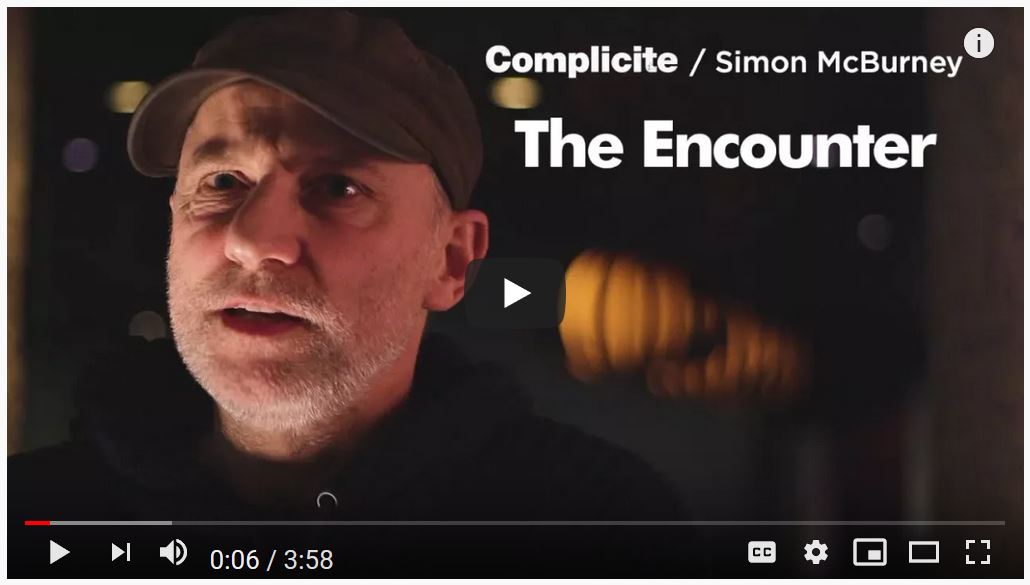
In a recent interview, McBurney considered why this particular work--a mind-bender that stretches the definition of book-to-stage adaptation--had translated so well to the small screen. He observed that one of the principal metaphors of The Encounter "was to have these headphones, so to cut yourself off from the usual sense of being in a collective audience and to make it a highly individual experience. And also, as a consequence of my speaking into several microphones and using a binaural microphone, to make it seem as if there is space around you, rather than speaking from the stage out.
"What happens is it appears that I'm right behind your head and... that intimacy as a consequence will work just as well when you're at the screen because the key thing is the sound is exactly the same. Now it's not just the technical expertise; it is of course the fact that part of the subject of it are the stories we tell, and this sensation of telling a story... So you have two forms of intimacy, if you like, that are going on and then you have the subject matter, the fact that you are going on an imaginative journey and a literal journey."
Where do we go from here? In May, McBurney told the Financial Times: "One of the phrases that I keep on hearing is 'when we get back to normal.' It seems to me there's a misplaced judgment there. Because we can't go back: there is only going forward and the question of what is normal is yet to be decided. We need perhaps to think about a new beginning, about thinking about the world differently." Maybe we go there.